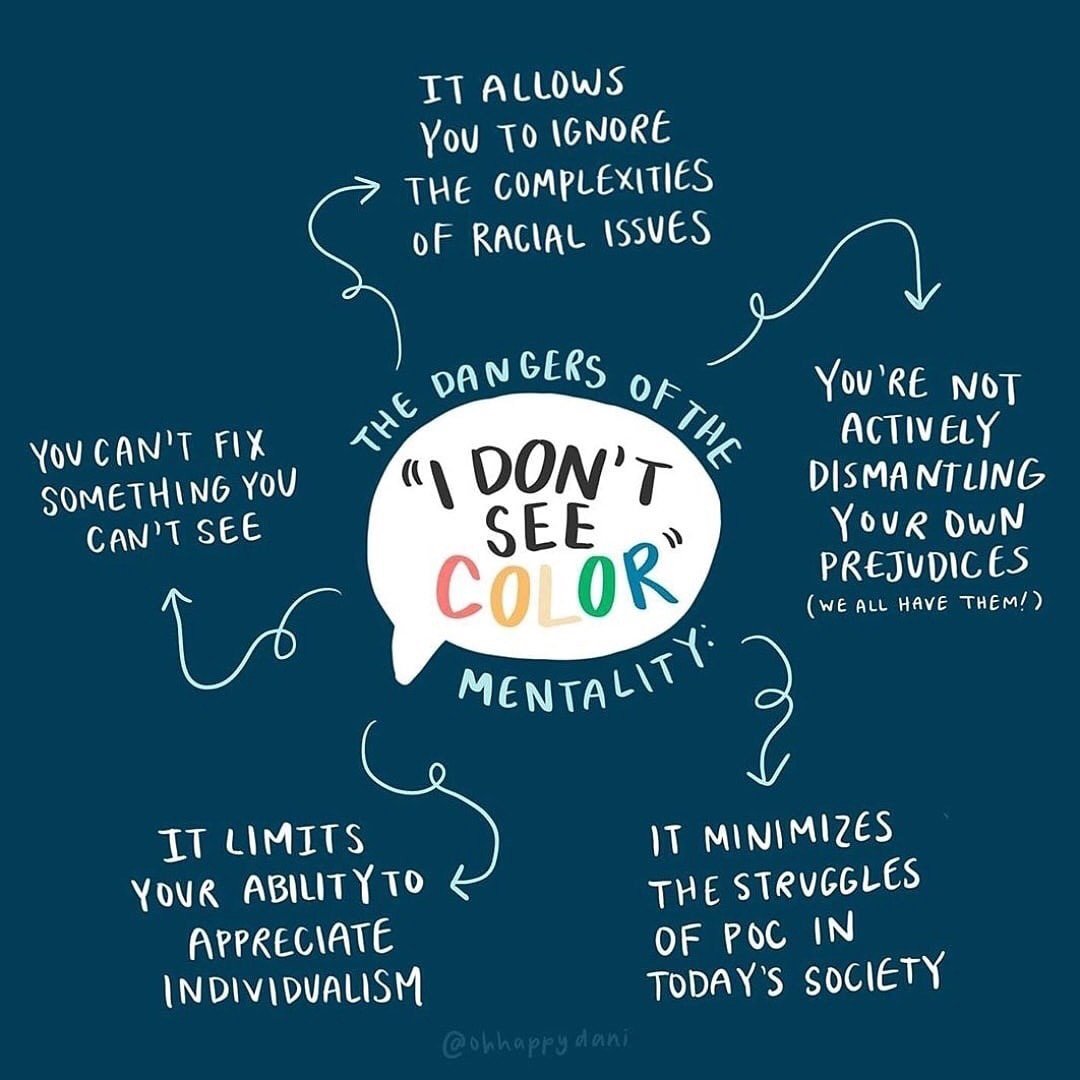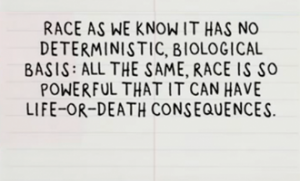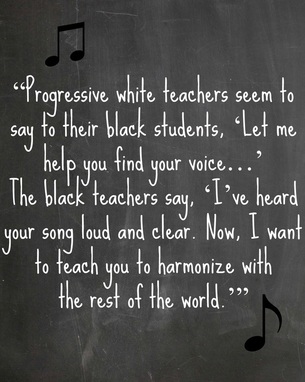Blog A.3: Literacy with an Attitude by Patrick J. Finn
Tuesday, May 30, 2023
Blog A.3: Literacy with an Attitude by Patrick J. Finn
Tuesday, May 23, 2023
Blog B.1: “Colorblindness is the New Racism” by Margalynne J. Armstrong and Stephanie M. Wildman
Blog B.1: “Colorblindness is the New Racism” by Margalynne J. Armstrong and Stephanie M. Wildman
In this article the authors, Armstrong and Wildman, argue that in order for society to tackle the issues with race, we must first recognize that there are constructed races and that “colorblindness” can hinder progress in addressing racism and issues that arise from systemic racism. “Learning about race and understanding its operation in the world is a key step for all members of society and certainly for people who will practice law or serve the public in the 21st century” (Armstrong & Wildman, p. 66). Even if the intention is to be comforting or inclusive, it can have negative impacts in interactions and understanding.
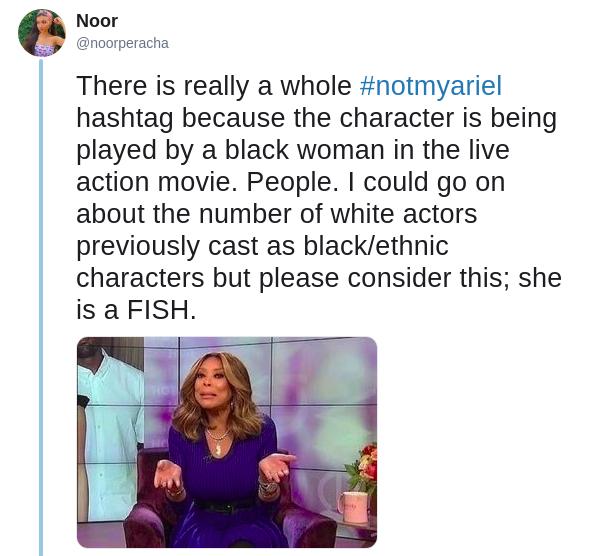 |
| No one sees color until it's a Disney princess... |
As a society it is our job to see color, and to understand how that can create privilege and disparities. As Armstrong and Wildman mention, we must learn from the experiences of others, including POC so that we have a better insight in how race plays a key role in our society, and then finding a way to dismantle these opportunities for one race verses the limitation other races deal with on a daily basis. Johnson and Delpit have both mentioned talking about race and not ignoring the elephant in the room, no matter how uncomfortable it can be.
Armstrong, M.J. & Wildman, S.M. (2013). “Colorblindness is the New Racism.”
Johnson, A. (2001). Privilege, Power, and Difference.
Lopez, G. (2016, July 11). Why you should stop saying “all lives matter,” explained in 9 different ways. Vox. https://www.vox.com/2016/7/11/12136140/black-all-lives-matter
TEDx Talks. (2018, July 6). The Exceptional Negro: Fighting to be Seen in a Colorblind World | Traci Ellis | TEDxHarperCollege [Video]. YouTube. https://www.youtube.com/watch?v=xqvZRO2LPmw
Friday, May 19, 2023
Blog A.2: The Silenced Dialogue by Lisa D. Delpit
The Silenced Dialogue by Lisa D. Delpit
3 Talking Points
- Pg 281: "They wear blinders and earplugs. They only want to go on research they've read that other White people have written. It just doesn't make sense to keep talking to them."
- I feel this in my soul. Sometimes it is overwhelmingly frustrating to talk from experience or with background knowledge that others might not have, and be ignored. These conversations are great examples of what gaslighting is like, by the end you are not sure what happened but you are sure that you were not "heard". My experience has been more towards the ELLs in my classroom. Although I am not an ELL I feel like I am constantly trying to explain best practices with my bilingual lens, and most of the time I am brushed off by monolingual professionals that do not have a background in ESL. So, I go into my room and do what is best for my students, and like Delpit states: be honest with your students about the realities of the culture in power and how to navigate it.
- Pg 290: "She is so boring, boring.* She could do something creative. Instead she just stands there. She can't control the class, doesn't know how to control the class.... I told her I don't know nothin' unless she tells me..."
- This stood out to me because I have heard this before from my students. I am usually the most culturally diverse teacher on my team, at any given year. One year I had a young female teacher from Oregon (she is white), the students hated her and were mean to her. I loved her. She was brilliant, kind, and honestly trying to make a difference. She was my math teacher and her brain was honestly amazing, but the kids didn't like her. When asked why, they stated that she was "too nice", "too soft spoken", and "blah". I then followed up with, why does being nice mean that you hate her? The students couldn't formulate a response back. We talked about how "we" are accustomed to a particular way of interaction with those with power, i.e. parents, teachers, etc. I also tell the students that while I understand what they are saying and where they are coming from (and my approach is direct and "authoritative") they need to understand that not everyone has the same experience. It wouldn't have fit her personality and overall person if she yelled at them. I did talk to her about setting direct instructions as opposed to ask students to make the right choice.
- Pg 293: "And in the meantime, we must take the responsibility to teach, to provide for students who do not already possess them, the additional codes of power."
- All day everyday I am constantly explaining to students the importance of education in relation to the cultural/social expectations in the world they live. We talk about the importance of formats and learning how to express themselves in various situations. I teach them to code switch, and really explain why it's important in relation to my own experiences. In my team of teachers I am the most like my students. I am from an inner city, I speak Spanish, I am the child of immigrants of a Latin American country, I grew up with a single mother, I have received free or reduced lunch my whole life, and I was taught that I had to fight harder than other groups in America. Using these points of similarities I try to educate the students about what I have needed to do to navigate this society. I even express that I am more authentic with them, then say my boyfriend's parents, because they are in the position of power/privilege. I become meeker (they have never seen me "pop off"), softer, less bilingual, and more "American". It's important for me to teach my students about this, because while my teachers never did this for me they helped me in a way that Delpit asks educators to; my teachers gave me the background knowledge to interact with the curriculum in the same way as my white American peers. They were explicit with their expectations in our behavior and academics. All my teachers were white, even my Spanish teachers were white, but they all gave me the education I needed; while my mother continued to foster my education in my Latino culture.
Tuesday, May 16, 2023
Blog A.1: Privilege, Power, and Difference by Allan G. Johnson
Privilege, Power, and Difference by Allan G. Johnson
3 Talking Points of the Reading
- Pg. 3 "It is also an issue across differences of gender, sexual orientation, and numerous lesser divides. Men's violence and harassment aimed at women is epidemic in the United States, for example, and show no sign of letting up anytime soon."
- While the chapter started with highlighting the Rodney King incident, I found that the author calling out how many differences have arise since then is important. My students not only deal with race being an issue, but everything else he mentioned in this snippet. As a society we keep creating more and more issues and barrier to keep each other separate.
- Pg. 7 "The simple truth is that when I go shopping, I'll probably get waited on faster and better than she will. I'll benefit from the cultural assumption that I'm a serious customer who doesn't need to be followed..."
- In being more reflective on privilege, I know that I have more privilege than my best friend who is black and Cherokee. One day she came to visit me at the store that I worked at, and while she waited for me to go on break she was browsing the walls and such. At this job we had to wear headsets so that we could communicate with each other. While I was finishing up with a customer, another associate mentioned that there was a customer with a big bag and a leather jacket... it was my friend. I went up to the associate and my supervisor calmly, explained she was waiting for me and that not to say such things on the headset, because if my friend heard them she would have the right to call corporate. I never told my friend because she would have been outraged (rightly so) and I didn't want her to feel bad.
- The Diversity Wheel above is filled out with my own information. It is an interesting visual about what others see on the outside. I was pretty aware of most of the things that puts me in a group of privilege, but I also know that I have attributes that might put me in situations of less privilege. My education, able-ness, sexuality, and even religious beliefs put me in some very privilege groups; however, I know that there are things on this wheel that would be more of a hinderance in our society. For instance, at 35 I am constantly asked about my parental status. I am not a mother, yes I would like to be, but I am not. It puts me in weird situations in society, not so much my family. Society wants me to be happy and a mom, or else I might be missing out on things that I SHOULD want to experience.
Monday, May 15, 2023
Culturally Responsive Teach Out Reflection
Culturally Responsive Teach Out Reflection For this Teach Out Project we decided to look into the culturally responsive teaching pedag...
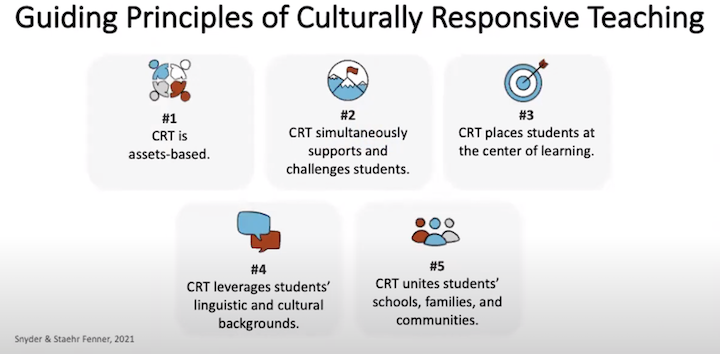
-
Teaching at the Intersections by Monita Bell 5 Tips for Being an Ally by @chescaleigh on YouTube Monita Bell beings the conversatio...
-
Blog B.2: Teacher Shortages and States' Responses *Note: I chose to follow the money for this article. This article is full of some gr...
-
Blog B.1: “Colorblindness is the New Racism” by Margalynne J. Armstrong and Stephanie M. Wildman In this article the authors, Armstrong ...

